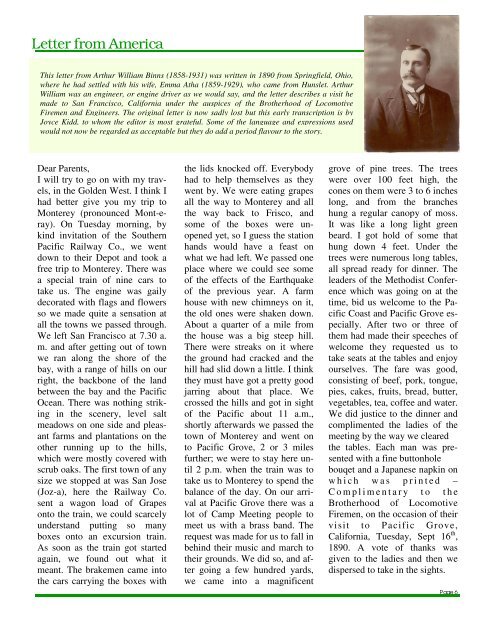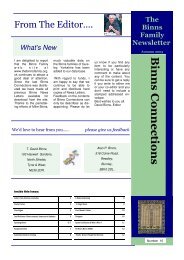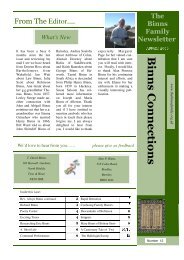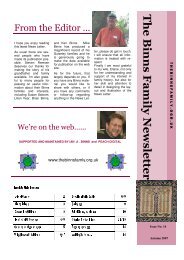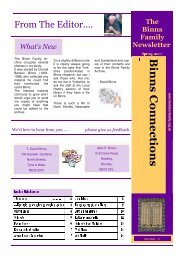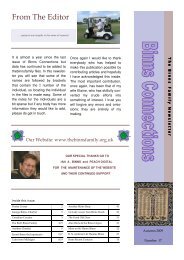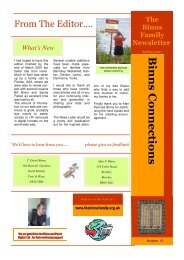James Jepson Binns - The Binns Family
James Jepson Binns - The Binns Family
James Jepson Binns - The Binns Family
Create successful ePaper yourself
Turn your PDF publications into a flip-book with our unique Google optimized e-Paper software.
Letter from America<br />
This letter from Arthur William <strong>Binns</strong> (1858-1931) was written in 1890 from Springfield, Ohio,<br />
where he had settled with his wife, Emma Atha (1859-1929), who came from Hunslet. Arthur<br />
William was an engineer, or engine driver as we would say, and the letter describes a visit he<br />
made to San Francisco, California under the auspices of the Brotherhood of Locomotive<br />
Firemen and Engineers. <strong>The</strong> original letter is now sadly lost but this early transcription is by<br />
Joyce Kidd, to whom the editor is most grateful. Some of the language and expressions used<br />
would not now be regarded as acceptable but they do add a period flavour to the story.<br />
Dear Parents,<br />
I will try to go on with my travels,<br />
in the Golden West. I think I<br />
had better give you my trip to<br />
Monterey (pronounced Mont-eray).<br />
On Tuesday morning, by<br />
kind invitation of the Southern<br />
Pacific Railway Co., we went<br />
down to their Depot and took a<br />
free trip to Monterey. <strong>The</strong>re was<br />
a special train of nine cars to<br />
take us. <strong>The</strong> engine was gaily<br />
decorated with flags and flowers<br />
so we made quite a sensation at<br />
all the towns we passed through.<br />
We left San Francisco at 7.30 a.<br />
m. and after getting out of town<br />
we ran along the shore of the<br />
bay, with a range of hills on our<br />
right, the backbone of the land<br />
between the bay and the Pacific<br />
Ocean. <strong>The</strong>re was nothing striking<br />
in the scenery, level salt<br />
meadows on one side and pleasant<br />
farms and plantations on the<br />
other running up to the hills,<br />
which were mostly covered with<br />
scrub oaks. <strong>The</strong> first town of any<br />
size we stopped at was San Jose<br />
(Joz-a), here the Railway Co.<br />
sent a wagon load of Grapes<br />
onto the train, we could scarcely<br />
understand putting so many<br />
boxes onto an excursion train.<br />
As soon as the train got started<br />
again, we found out what it<br />
meant. <strong>The</strong> brakemen came into<br />
the cars carrying the boxes with<br />
the lids knocked off. Everybody<br />
had to help themselves as they<br />
went by. We were eating grapes<br />
all the way to Monterey and all<br />
the way back to Frisco, and<br />
some of the boxes were unopened<br />
yet, so I guess the station<br />
hands would have a feast on<br />
what we had left. We passed one<br />
place where we could see some<br />
of the effects of the Earthquake<br />
of the previous year. A farm<br />
house with new chimneys on it,<br />
the old ones were shaken down.<br />
About a quarter of a mile from<br />
the house was a big steep hill.<br />
<strong>The</strong>re were streaks on it where<br />
the ground had cracked and the<br />
hill had slid down a little. I think<br />
they must have got a pretty good<br />
jarring about that place. We<br />
crossed the hills and got in sight<br />
of the Pacific about 11 a.m.,<br />
shortly afterwards we passed the<br />
town of Monterey and went on<br />
to Pacific Grove, 2 or 3 miles<br />
further; we were to stay here until<br />
2 p.m. when the train was to<br />
take us to Monterey to spend the<br />
balance of the day. On our arrival<br />
at Pacific Grove there was a<br />
lot of Camp Meeting people to<br />
meet us with a brass band. <strong>The</strong><br />
request was made for us to fall in<br />
behind their music and march to<br />
their grounds. We did so, and after<br />
going a few hundred yards,<br />
we came into a magnificent<br />
grove of pine trees. <strong>The</strong> trees<br />
were over 100 feet high, the<br />
cones on them were 3 to 6 inches<br />
long, and from the branches<br />
hung a regular canopy of moss.<br />
It was like a long light green<br />
beard. I got hold of some that<br />
hung down 4 feet. Under the<br />
trees were numerous long tables,<br />
all spread ready for dinner. <strong>The</strong><br />
leaders of the Methodist Conference<br />
which was going on at the<br />
time, bid us welcome to the Pacific<br />
Coast and Pacific Grove especially.<br />
After two or three of<br />
them had made their speeches of<br />
welcome they requested us to<br />
take seats at the tables and enjoy<br />
ourselves. <strong>The</strong> fare was good,<br />
consisting of beef, pork, tongue,<br />
pies, cakes, fruits, bread, butter,<br />
vegetables, tea, coffee and water.<br />
We did justice to the dinner and<br />
complimented the ladies of the<br />
meeting by the way we cleared<br />
the tables. Each man was presented<br />
with a fine buttonhole<br />
bouqet and a Japanese napkin on<br />
w h i c h was printed –<br />
C o m p l i m e n t a r y to the<br />
Brotherhood of Locomotive<br />
Firemen, on the occasion of their<br />
visit to Pacific Grove,<br />
California, Tuesday, Sept 16 th ,<br />
1890. A vote of thanks was<br />
given to the ladies and then we<br />
dispersed to take in the sights.<br />
Page 6


